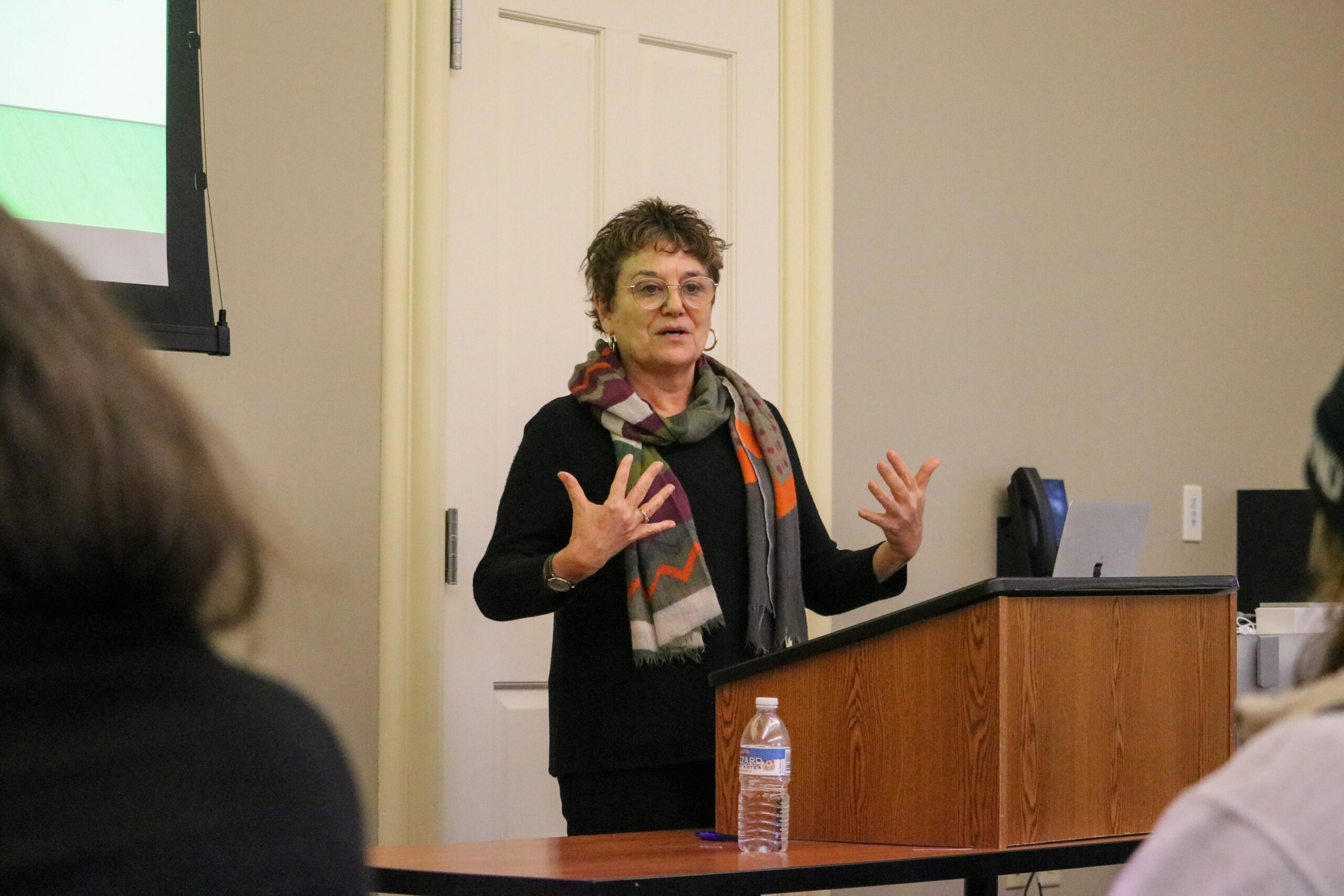“Uncle Tom’s Cabin in Paris”: Sarah Maza explores nineteenth-century France racism
April 21, 2023
 Emily Campbell
Emily CampbellStudents, faculty and community members gathered in a crowded Adams Hall classroom this past Wednesday to hear the Department of History’s latest guest lecturer: Sarah Maza, professor of history at Northwestern University. Maza lectured on the initial reception of “Uncle Tom’s Cabin” in France and how it reveals the complexity of European racism at the time.
Maza’s topic holds special significance to the local community, as Harriet Beecher Stowe authored the popular anti-slavery novel in 1852 while living in Brunswick. The novel tells the story of an enslaved man in the American South, Uncle Tom, and other enslaved people whose stories revolve around his own.
Maza described the popularity “Uncle Tom’s Cabin” enjoyed in France but noted that Stowe’s work was treated as a novelty rather than a serious literary work. The story received its most acclaim and attention in Parisian theaters.
“The novel was a very intense fad for a few months, and then very quickly it was made into several plays,” Maza said. “The novel was published in December, and the plays were out there by January of 1853…. More people saw this play than read the novel.”
In these dramatizations, Maza identified the French playwrights’ selective interpretations of the novel. White characters that took a minor role in Stowe’s book were elevated to central roles in the plays, Uncle Tom’s role was diminished. Additionally, Maza noted that racial caricatures and stereotypes not present in the novel were added to theatrical interpretations.
The plot changes in the dramatization of “Uncle Tom’s Cabin” in Parisian theater were part of a pattern in French popular culture in the 19th century. Maza detailed instances of other theatrical adaptations in which Black characters’ roles were diminished or devalued, often promoting white or mixed-race characters in their stead.
Maza then explored the social conditions in 19th century France that catalyzed portrayals of Blackness like those found in “Uncle Tom’s Cabin,” noting that the abolition of the French aristocracy during the French Revolution led many French people to believe they had eradicated racism.
This widely-believed misconception allowed for the socially acceptable promulgation of racial caricatures and twisted depictions of Blackness in French popular culture, especially in the theater. Maza added that in “Uncle Tom’s Cabin” and other plays, French playwrights elevated mixed-race characters played by white actors, reinforcing problematic portrayals of Black figures in popular culture.
“Sidelining ‘Uncle Tom’ is part of a pattern of deep discomfort about the representation of Blackness on the French stage, even as this was a period in which the French were crowing about their own abolition of slavery,” Maza said.
Professor of History Patrick Rael concurred with Maza. Rael said that slavery’s continued and brutal existence in the United States, widely exposed in “Uncle Tom’s Cabin,” gave European nations a pretense to overlook their own racial injustices and promote problematic characterizations of Black figures.
“The United States is often figured in other literatures as the epitome and paragon of racism,” Rael said. “The U.S. is a last holdout.… But in a way, when you’re pointing the finger at somebody else, that relieves you of the obligation to think about it here. ‘We don’t practice slavery. We don’t practice prejudice of race. That’s what the Americans do.’”
Associate Professor of History Meghan Roberts, who was advised by Maza while completing her doctorate at Northwestern, said that Maza’s work is closely related to her own pedagogy at the College.
“[Maza] is very interested in what’s called the ‘social imaginary,’ which is how people think about society, how they imagine themselves to be part of it, what they think society is made up of,” Roberts said. “When I teach my classes, I’m always trying to help students think through how people imagined the world that they were in as well as the material reality of it.”
Julia Lyne ’23, one of Roberts’ students, agreed.
“I thought [the talk] was great,” Lyne said. “I’ve learned a lot about ‘Uncle Tom’s Cabin’ but never in this context.
Roberts added that Maza’s approach to exploring power structures across time and place reflects the College’s academic commitment to exploring difference, power and inequity.
“It is so important for students to think about difference, power and inequity in different nations in different spaces,” Roberts said. “You can understand how systems of power work.”
Nikki Harris contributed to this report.

Comments
Before submitting a comment, please review our comment policy. Some key points from the policy: